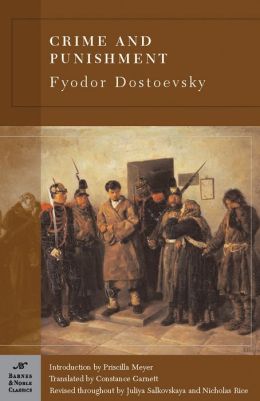- ISBN-13: 9781593080815
- Publisher: Barnes & Noble
- Publication date: 2/1/2007
- Series: Barnes & Noble Classics Series
- Pages: 576
Raskolnikov soon realizes the folly of his abstractions. Haunted by vivid hallucinations and the torments of his conscience, he seeks relief from his terror and moral isolation - first in Sonia, the pious streetwalker who urges him to confess, then in a tense game of cat and mouse with Porfiry, the brilliant magistrate assigned to the murder investigation. One of the most gripping crime stories of all time, Crime and Punishment delineates the theories and motivations that underlie a bankrupt morality.
I knew I was doomed from reading the first paragraph, simply about Raskolnikov sneaking past his landlady because he didn't want to talk to her, and I related way too much. Like, "Holy shit, this is actually me." Happily, it didn't turn out completely that way, but close enough to be uncomfortable.
Crime and Punishment is the story of a young college student who has a theory about great men being able/allowed to do things that ordinary men aren't. This leads to him committing a murder pretty much simply to prove his theory and prove himself one of said great men.
What follows is the slow mental breakdown of Raskolnikov (clearly not the great man he thought he was - aha). He encounters sundry side characters who either contribute to his burden or, in their attempt to understand him, give him hope. There's his mother, Pulcheria Alexandrovna, and his sister, Dunia. His friend Razumikhin, his (girl)friend, Sonia. Of course, he has his antagonists in the forms of Porfiry and Svidrigailov. Oh, the Russian names. Complicated things, my friends, but these are the easiest to remember, I suppose. They all have interweaving storylines - they all know each other in some capacity.
What makes this novel so compelling is how utterly human they all are. Especially Raskolnikov. You relate to him, his wanderings, his tortures, his emotions. Even if you never would have come up with his theory, you see how he came to it, and all of his actions and his emotions following the murder are so supremely human, I can't even. I related to him even more than I thought. He lashes out at those who love him most when he's angry and hurt and ashamed because he feels he doesn't deserve it, or he knows they will take the abuse and still love him after. It's something I know I do in my own life. His struggles not to collapse entirely when he realizes that Porfiry expects him. Side note about Porfiry: I started off really being irritated by him and his method of police work, but he really pulled through in the end. In his last scene in the book, I even felt a little fondness for the old fellow.
One of the best parts of the novel, is its overall happy ending. I won't spoil it for you, but I will say that 70% of the characters witness significant improvements to their lives and overall happiness. I'll leave you to guess which ones. Also, the villains of the piece are justly dealt with. I didn't feel that they escaped what they deserved, and I think it was just so refreshing to have a Russian author not crush all my hopes and dreams that I really fell in love with it.
Overall: A+
While it dragged in places, as the Russian authors do, I was just so in love with the depiction of raw humanity and the ending that I'll forgive it.

No comments:
Post a Comment